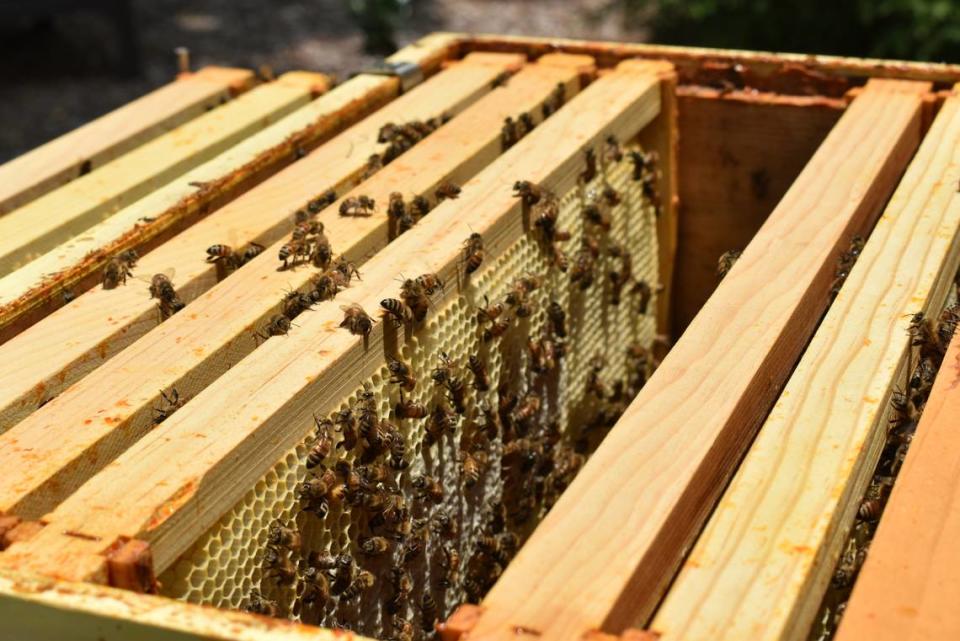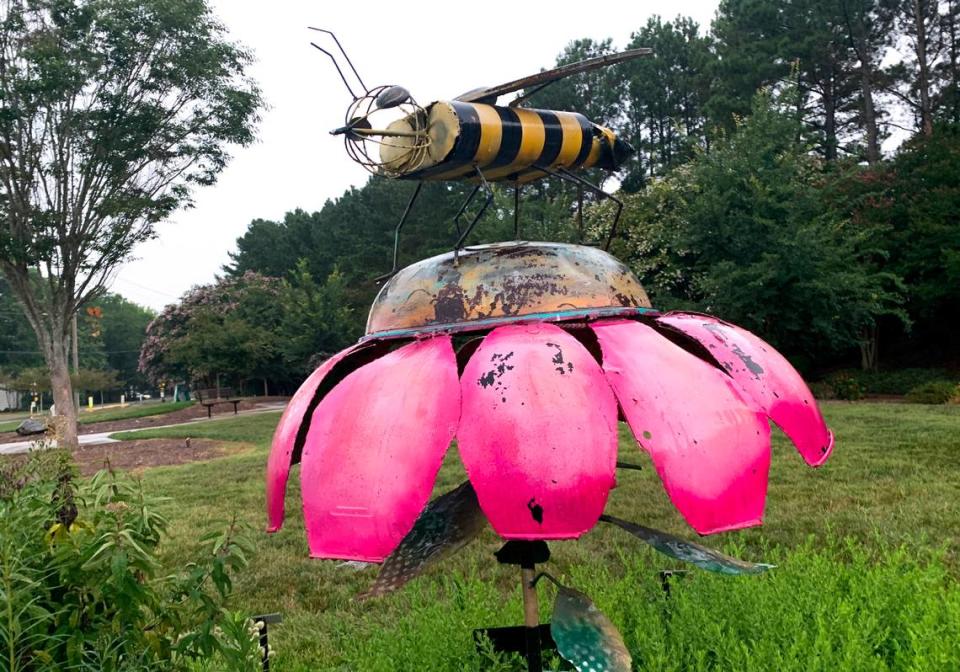NC town calls itself a ‘Bee City’ but HOA says backyard hives must go
Dawn Reid lives in a designated Bee City — where the mayor himself is a beekeeper — but a recent conflict with a neighbor has prompted the HOA of her Matthews neighborhood to threaten to oust her three backyard beehives.
Reid has lived in Matthew’s Pleasant Ridge community for eight years. Three years ago, she decided to invest in some hives after attending bee school through the Mecklenburg County Beekeepers Association.
Small-scale beekeepers can help boost the dying bee population that is critical for agriculture in the state. Bees help pollinate the fruits and vegetables that make up a third of the food we eat, according to the N.C. Department of Agriculture website.
Still Reid’s HOA says her beehives violates neighborhood rules.

Prior to purchasing her hives, Reid said she talked to her neighbors — at first, there weren’t any problems.
Then, a new set of neighbors moved in next door two years ago. Earlier this month, her neighbor filed a complaint to the homeowner’s association saying the bees were a “huge concern” and requesting that they be removed.
Reid estimates that she has about 180,000 bees, but the exact bee count varies.
Her neighbor, in the HOA complaint, blames a swarm of the bees for stinging her puppy and says that bees have been getting into the pool the family installed at the start of the pandemic. Two members of their family are highly allergic to bees, the neighbor told the HOA.
Reid reached out to an apiary inspector from the N.C. Department of Agriculture after she was informed that the puppy was stung.
The apiary inspector, Nancy Ruppert, took samples of Reid’s bees to see if any were Africanized — a type of bee that is much more aggressive than typical honeybees. None were, Ruppert said in an interview with The Charlotte Observer last week.
Ruppert said it was possible that Reid’s bees were responsible for the puppy’s accident since they were likely attracted to the water in the neighbor’s pool. She added, though, that Reid’s bees were very calm and well taken care off.
“The bees were, I would say, pretty docile,” Ruppert said.
Both the neighbor who filed the complaint and HOA president Kenneth Horn refused to be interviewed when reached by the Observer.

Notice of removal
Two weeks ago, the HOA told Reid she must remove the beehives as soon as possible. A written notice says residents can’t raise or breed animals in the neighborhood.
Reid has requested a formal hearing that will take place on August 10 at the HOA president’s house.
Already, Reid has moved her hives to the opposite side of her yard to try to appease her neighbors.
“I want to be neighborly, I want to work with them,” Reid said.
She decided to wait until late July to move them so as not to disrupt their honey production. In late summer, bee populations start to naturally wane as they prepare to survive the colder seasons.
Moving the bees could potentially disrupt the hives, and Reid said that already there’s a swarm of confused bees who have been unable to find their relocated homes.
“It’s what I was concerned about in moving them,” she said.
Benefits of beehives
Part of why Reid purchased the bees was for her garden.
“We’ve seen a major yield increase in our blueberries,” she said.
This year they’re expecting to harvest about 75 pounds of honey, some of which they gift to friends and neighbors.
One of her neighbors says the bees have helped her garden as well.
“I’ve definitely seen an increase in the productivity of our yard since they’ve been around,” said Lori Semel, who lives on Reid’s street.
Semel said Reid helped her catch a swarm of rogue bees next to her house that had lost their queen.
“She (Reid) was here in ten minutes with her outfit — suited up and ready to go,” Semel said.
While stuck at home during COVID-19, Reid said the bees brought great comfort to her family through grieving losses on her husband’s side.
“I would sit, and I would watch those bees, and they just did their job,” Reid said.
Conflict with HOA
The hives have been about a $2,000 investment for Reid, an investment she says she doesn’t want to lose if the bees need to be moved elsewhere.
She said she is trying to find alternative homes for the bees, but she wants to keep them close enough so that they can still help pollinate her garden.
“I am trying on 52 fronts here to figure out a solution, and I’m just disappointed that the HOA is just like ‘tough luck,’” Reid said.
If she is unable to find an alternate home for the bees, she is considering moving the hives to the yard of a neighbor whose property isn’t in the HOA jurisdiction.
In that case, Reid says, the hives would be much closer to the property of the neighbor who filed the HOA complaint.
She said, though, that she wants to find a “more workable solution.”
“I am a member of this community,” Reid said. “I pay HOA dues, the board represents us too.”
Matthews — a Bee City
In 2014, Matthews was designated as the fifth Bee City in the nation. From bee statues to Matthews Elementary School’s bee mascot, passion for these pollinators is heavily present in the town.
John Higdon, the mayor of Matthews, is a beekeeper himself. He also lives in a neighborhood with an HOA and owns two beehives.
“As a beekeeper I can tell you that generally bees are very docile,” he said. “They’re not going to fly up and sting somebody unless you basically stick your hand in the hive.”
The city has several pollinator gardens as well that help support honeybees.
In North Carolina there are protections for local beehives.
The Honey Bee and Honey Act of 1977 declares it in the public interest to promote and protect bees, especially for small beekeepers. It makes it illegal for counties to pass laws that prohibit people from owning five or fewer hives.
Still, HOAs reserve the right to restrict personal beekeeping in their communities. According to Matthew’s town attorney Charlie Buckley, a HOA can make more restrictive rules than state law.
The population of honeybees across the nation has been declining. According to data from the Bee Informed Partnership, North Carolina lost 30.7% of its reported bee colonies this past winter.
“Most colonies of honeybees just can’t make it on their own,” Ruppert said.

